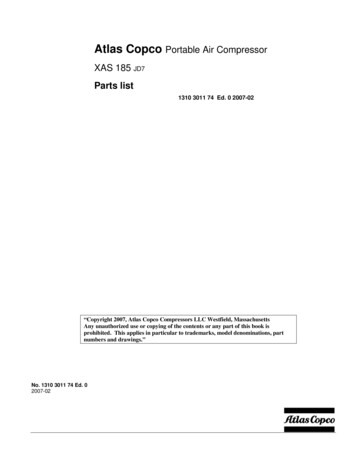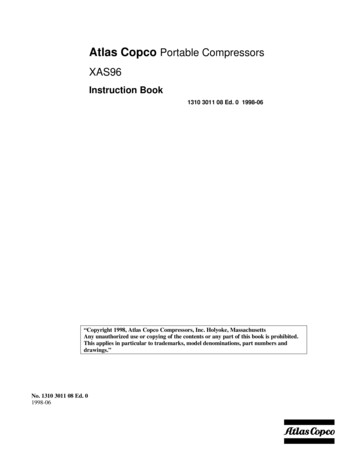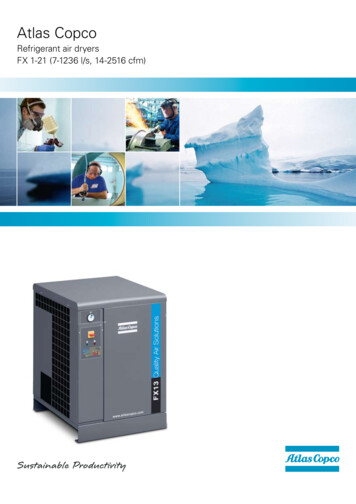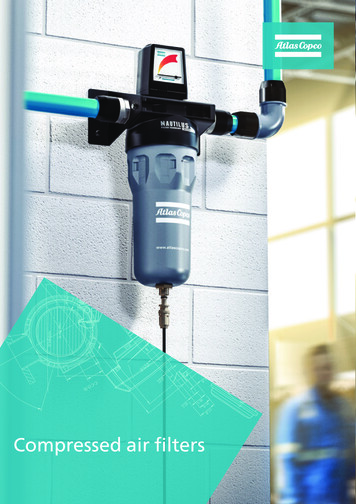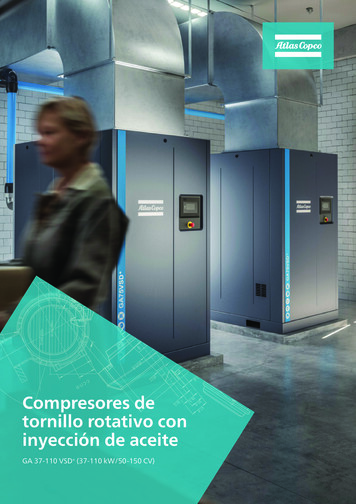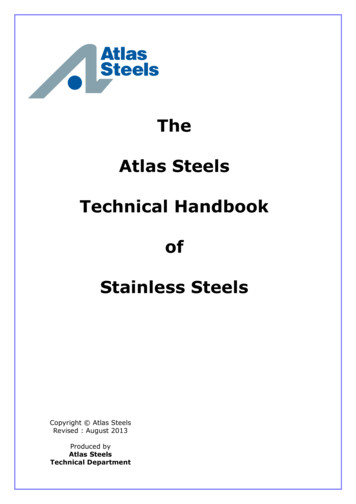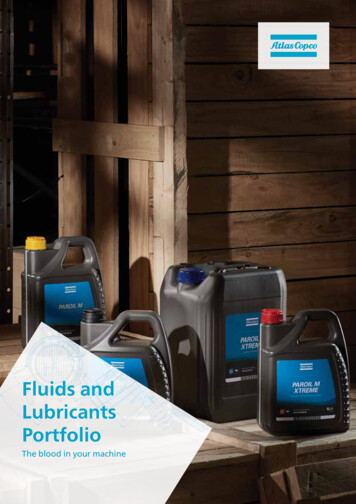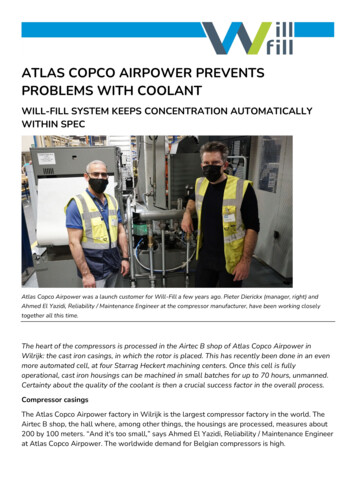
Transcription
ATLAS COPCO AIRPOWER PREVENTSPROBLEMS WITH COOLANTWILL-FILL SYSTEM KEEPS CONCENTRATION AUTOMATICALLYWITHIN SPECAtlas Copco Airpower was a launch customer for Will-Fill a few years ago. Pieter Dierickx (manager, right) andAhmed El Yazidi, Reliability / Maintenance Engineer at the compressor manufacturer, have been working closelytogether all this time.The heart of the compressors is processed in the Airtec B shop of Atlas Copco Airpower inWilrijk: the cast iron casings, in which the rotor is placed. This has recently been done in an evenmore automated cell, at four Starrag Heckert machining centers. Once this cell is fullyoperational, cast iron housings can be machined in small batches for up to 70 hours, unmanned.Certainty about the quality of the coolant is then a crucial success factor in the overall process.Compressor casingsThe Atlas Copco Airpower factory in Wilrijk is the largest compressor factory in the world. TheAirtec B shop, the hall where, among other things, the housings are processed, measures about200 by 100 meters. “And it's too small,” says Ahmed El Yazidi, Reliability / Maintenance Engineerat Atlas Copco Airpower. The worldwide demand for Belgian compressors is high.
Two operators per shiftWhen he joined the compressor manufacturer thirty years ago, each CNC machine still had oneoperator. In the new production cell with the four horizontal machining centers Starrag HeckertHEC 630, 500 casings per day will be processed, with only two operators per shift. Manualintervention is minimal from the moment the cast iron, semi-finished products enter the factory inWilrijk. “All raw parts automatically enter the Fastems warehouse, on the pallet on which theyarrive here. When we need to machine them, the transport robot puts them in the second stationand the operator places them on the caliper. Casings that we don't process yet go back to thewarehouse; the calipers with the clamped housings are automatically placed in the correctmachine and go to the second magazine after processing”, Ahmed El Yazidi explains the differentsteps in the process. Unique to this production cell is the robotized tool magazine, which runs thelength of the entire cell. The robot automatically loads the machines with the correct tools,including enough sister tools, and places the tools; whose inserts need to be replaced; in theloading station. This is where the tool presetters set up the tooling for all four machining centers;the rest is automated. “We only have a fixed place for the large tools, the rest is placed randomlyand thanks to the chip in the holder, the system knows which tool is in which position,” explainsEl Yazidi.Solve quality problemsAll four Starrag Heckert machining centers in this cell are equipped with the latest Will-Fillsystem for automatic monitoring and maintaining of the coolant level. Atlas Copco Airpower wasthe launching customer for the Belgian Will-Fill a few years ago. In the compressor factory, thefirst Will-Fill SD520 system is installed. Eight systems are now running. The first Will-Fillsystem was installed on a Makino CNC machining center. Ahmed El Yazidi: “The concentrationshowed strong peaks. If the concentration became too low, mold formed, which meant that thelubricating effect was gone.” By installing the Will-Fill system, the concentration of the emulsionremains at the same level and the chance of mold formation is practically reduced to zero. Theservice life is now six months. With another machine, tool breakage often occurred at some point.Research eventually showed that too low a concentration of the emulsion was the cause. Theinstallation of a Will-Fill system put an end to tool breakage.Also in the new cellFor the Reliability / Maintenance Engineer it was therefore a foregone conclusion from the startthat the four new Starrag Heckert machines had to be equipped with the Belgian monitoring,analysis and filling system. Not only to improve the reliability of the process. Also because hewants to avoid too high a concentration. “At that point, the employees run a greater risk of skinrashes. We must also prevent that.” The Will-Fill system is in line with Atlas Copco Airpower'svision of what a modern machining production looks like. “We strive for as few man-dependingcoolant controls”, says Ahmed El Yazidi. Normally, two employees of the maintenance team are
busy every day checking the cooling lubricant bath and the oil in all machines. This no longer hasto happen with the eight machines equipped with the Belgian system. The Will-Fill systems notonly measure the concentration, but measure ten (NEO version) or twelve (ION version)parameters and will automatically fill water and emulsion if the concentration surpasses apredefined threshold value.Log data for analyticsThe new Will-Fill systems, now the fourth generation, are also in line with the roll-out ofIndustry 4.0 at the Atlas Copco factory. In Wilrijk, all 120 CNC machines will be connected.Thanks to the integrated OPC UA interface, the two new Will-Fill systems are ready to log dataand forward it either to Will-Fill's own dashboard or, as with Atlas Copco, to an internalcompany dashboard. This allows Ahmed El Yazidi to see the important parameters of the coolantbath of each machine at a glance from his desk. Because the Will-Fill system automaticallymaintains concentration, the Atlas Copco Airpower maintenance team basically no longer has toworry about it. There is a second level of surveillance in the system. Should the concentration ofone of the cooling lubrication baths exceed the limit values, an e-mail will be sent to themaintenance staff, including instructions on what to do. The compressor manufacturer uses thedata for yet another purpose. Because all data is logged, the quality team can immediately referto the measured values of the coolant if there are any problems with the products or with thetools. This allows one to quickly rule out one possible cause, something that was previouslyimpossible because no historical data on the coolant was available.“Monitoring the coolant and logging all data helps us to keep the machining process stable.” Andthat is one of his core tasks as a Reliability / Maintenance Engineer.
PHOTOSEach of the four Starrag Heckert HEC 630 horizontal machining centers is equipped with a Will-Fill ION system. Thisautomatically maintains the coolant concentration and logs all data for further analysis.Recently, a fully automated production cell with four horizontal machining centers and two FMS systems fromFastems has been operating in the compressor factory in Wilrijk. In the first warehouse all raw pieces are stored, inthe second the processed casings.
As soon as the concentration of one of the coolant baths exceeds a threshold value, an e-mail is sent to themaintenance employees.Developing togetherPieter Dierickx, managing directior of Will-Fill, considers the relationship with Atlas CopcoAirpower to be special for the still young Belgian company. “That such a large company boughtour system at the time is special, it exudes confidence.” Since then, Will-Fill has been able tofurther develop the system to automatically maintain the coolant bath, using the compressormanufacturer's practical experience. As a result, the team behind Will-Fill has been able to tailorthe system increasingly better to the questions and experiences from the field of a company thatprocesses a lot and produces continuously. With the latest monitoring systems, machining SME’scan also benefit from the experience gained at Atlas Copco Airpower. Pieter Dierickx: “The largecompanies log the data to their own systems. We release our protocols for that. For smallercompanies, Will-Fill has its own dashboard that they can use.”
system for automatic monitoring and maintaining of the coolant level. Atlas Copco Airpower was the launching customer for the Belgian Will-Fill a few years ago. In the compressor factory, the first Will-Fill SD520 system is installed. Eight systems are now running. The first Will-Fill system was installed on a Makino CNC machining center.
